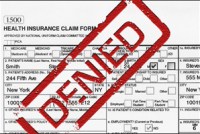Latest KFF Health News Stories
Health On The Hill Transcript: Democrats On Defense As Republicans Plan Attack On Health Law
House Republicans are holding committee hearings this week on the health law’s provisions governing Medicare, abortion and small business.
Sebelius Vows To Ensure CLASS Program Is Financially Viable
HHS is considering a number of options to make sure healthy, less costly people are attracted to the long-term care program and costs are held in check.
Alternatives To Mandating Insurance? Maybe
Some experts are proposing alternatives to mandating that nearly all Americans purchase health insurance – a requirement in the health law – including offering discounts for early buyers and instituting eligibility periods to use subsidies.
Insurers, Consumer Groups Tussle Over Appeals Rule
The new health law requires beefed-up appeals processes, but insurance companies and advocates are battling over exactly what that means.
President Obama On Health Law: ‘Let’s Fix What Needs Fixing And Move Forward’
In his State of the Union message, the president also said he’s “not willing … to go back to the days when insurance companies could deny someone coverage because of a pre-existing condition.”
FAQ: Selling Health Insurance Across State Lines
More than 60 House Republicans are sponsoring a bill to permit the sale of health insurance across state lines. Consumer advocacy groups argue such provisions would erode many state protections.
The Health Law’s Co-op Program: A Political Device Or The Affordable Alternative Consumers Need?
It will take a serious and sustained effort to make co-ops a viable insurance option for consumers and small business owners.
House Republicans Put Spotlight On HHS Insurance Office
The new Republican chairmen of a powerful House committee and its investigative subcommittee want Obama administration officials to explain exactly how they’re implementing the health law.
New Scrutiny For Insurance Mandate After Repeal Vote
Republicans are eager to repeal the requirement in the health care law. Public support for the mandate is shaky, and even some Democrats have signaled a willingness to look at alternatives. Some – but not all – health policy experts say the mandate is essential. KHN interviewed several to get their views.
Insurer and Hospital System: Why Can’t We Be Friends?
In North Carolina’s Research Triangle, two forces so often at odds — a major health care system and the region’s dominant insurer — announced that they would work together in the interest of better, cheaper medicine.
A New ‘Definition’ For Health Care Reform
Pursuing health reforms that transform current health insurance arrangements into aproaches based on defined contributions will set in motion a competitive dynamic from which all Americans would benefit.
Obama Administration’s Balancing Act: Health Insurance Benefits Vs. Costs
Advocacy groups are lobbying as government advisory panel tackles key question: What benefits must insurers cover?
Some States Have Options To Help Consumers Find Individual Health Coverage
For people who can’t get insurance through work, finding a plan is often difficult. In addition to the high-risk pools that have recently generated a lot of attention, other options may be available, depending on which state a consumer lives in.
Can We Stop Calling Them ‘Consumer Protections’ Now?
These supposed “consumer protections” are hurting millions of Americans by increasing the cost of insurance and the cost of hiring, as well as driving insurers out of business. They should be called what they really are: regulations that can hurt even more than they help.
Insurers Clash With Hospitals And Doctors Over ACO Rules
Powerful interests that are supposed to create and run the health law’s new accountable care organizations are fighting over what the rules governing ACOs should say.
The Avastin Decision: A Rational Decision Or Rationing?
Sometimes the noisiest voices in the health overhaul debate don’t make a good faith effort to acknowledge important scientific or policy-oriented nuances in their arguments. It’s happening again in the wake of a controversial regulatory ruling about a cancer drug.
Improving The Health Law In 2011: Realistic Ways To Reach Bipartisan Compromise
There are ways for Democrats and Republicans to agree to improve the new health care law in 2011.
Insurers Sometimes Reject Neonatal Intensive Care Costs
In these specialized units for premature infants or babies with special needs, the doctors and other personnel may not be under contract with an insurer’s network even though the hospital is covered.
Health Care Battles To Surge Anew In 2011: Jessica Marcy
KHN reporters preview some of the big issues coming this year: KHN reporter Jessica Marcy says concerns continue about consumers’ access to care.
Health Care Battles To Surge Anew In 2011: Bara Vaida
KHN reporters preview some of the big issues coming this year: KHN contributing writer Bara Vaida says the relationship between five major insurance companies and their trade group will be interesting to watch.












